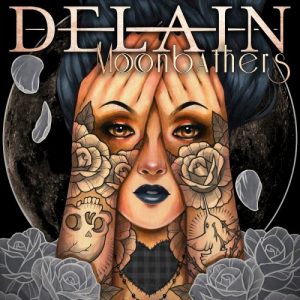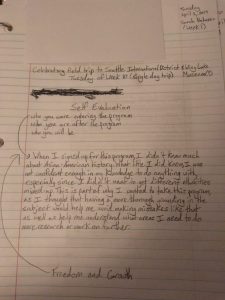
The cover for the symphonic metal band Delain’s album Moonbathers features a pale-skinned woman dominating the image. Her head is contrasted by a dark background, which appears to be a lunar eclipse. The moon is large and as a result the eclipse creates a halo around the woman’s head. Her arms cover most of her face as she places her hands over her eyes. However, her eyes are still “visible” through her arms in the form of tattoos on the backs of her hands, which replace her true eyes. The false eyes are perfectly symmetrical with shapely eyebrows sitting “above” them on her knuckles. The rest of her arms are covered by more tattoos, starting with roses covering her wrists. On her right arm (the viewer’s left) there is a tattoo of an upside-down human skull without a jaw. The skull seems to be peering at the right side of the image. On her left arm (the viewer’s right) there is a tattoo of a hummingbird drinking from the large rose on her wrist. There are tattoos of a rose partially visible on each side of her neck, and in the center of her neck there is an upright, plaid, heart-shaped tattoo which appears to be stitched into her skin. There are groups of roses in the bottom corners of the image which partially conceal the bottoms of the woman’s arms and her shoulders. They are all the same as the woman’s tattoos, only gray roses instead of outlines. Three petals fall around the woman’s head, as gray as the flowers they came from. The only color in the image comes from the woman’s flesh as well as her lips and hair, which are both a dark blue that is so desaturated it’s almost dark gray.
The woman’s mouth is closed, with a slight frown teasing the corners of her lips and making her seem both stately and solemn, impassiveness overtaking any emotion before it can reach the viewer. The hummingbird seems full of life and buzzing with energy, making it seem as though the skull is looking towards it and longing for what it no longer has. By covering her eyes, the woman’s true self is unknown to us; she only allows us to see what she wants us to see. But in doing so, she appears to be blinding herself and is as a result caught between life and death, as she can neither be lively like the hummingbird nor can she be as still as the skull. The roses surrounding the woman are gray, but seem translucent, as though to say that they too, are only shadows of what they used to be, like ghosts who are clinging to life but no longer truly exist. So too, is the moon overtaken by shadows and now exists in an in-between state of there and not-there. The moon, however, is in a transient state. The eclipse will not last forever; there will be an end, and the moon will shine brightly once more with the reflections of the sunlight. There is a hopeful quality to this, as it implies that the woman will similarly break free of the darkness and emerge into the light.
